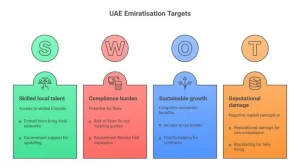Learn about the UAE’s Emiratisation targets for the private sector. Understand the goals, initiatives, and potential impact on businesses and employment.
UAE’s private sector just got a new rulebook—and it’s non-negotiable.
Behavioral economics teaches us that incentives drive change. UAE, however, has added a twist: mandates. Since 2022, the government has rolled out aggressive Emiratisation targets for the private sector, aiming to boost Emirati employment by 2% annually.
But here’s where it gets juicy: companies treating this as a compliance chore are missing the bigger play. Take a Dubai fintech firm that grumbled about quotas—until their Emirati hires landed a game-changing client deal through local networks. UAE’s Emiratisation targets for the private sector are a blueprint for sustainable growth.
In this blog post, we dissect how to turn obligation into opportunity.
Key Takeaways:
- UAE’s workforce is about to get a serious makeover.
- Private companies are no longer on the sidelines when it comes to hiring local talent.
- UAE Emiratisation targets for the private sector are front and center.
- This shift means rethinking recruitment strategies, compliance processes, and long-term workforce planning.
What Are the UAE Emiratisation Targets for the Private Sector?
UAE government is pushing private companies to hire more Emirati nationals. These aren’t voluntary guidelines — they’re firm targets tied to industry sectors, company size, and timelines.
Here’s a quick snapshot of what the UAE Emiratisation targets in the private sector look like:
- Private sector companies with 50 employees or more must ensure Emiratis make up 4% of their skilled workforce by the end of 2024.
- This target rises by 2% every year until 2026.
- Not meeting these quotas? That’s a AED 96,000 fine per Emirati shortfall per year, and yes, it’s enforced.
It’s part of the UAE’s broader economic diversification strategy. The government wants to future-proof the economy by upskilling and employing its citizens in the private sector, reducing overreliance on foreign talent.
Why Ignoring Emiratisation Targets Hurts Business
Think of UAE Emiratisation targets for the private sector as a friendly nudge with teeth. Ignore them, and you’ll face:
- Fines up to AED 96,000 annually for missing quotas
- Recruitment freezes halting expansion plans
- Reputational bruises in a market that rewards compliance
- Missed incentives of tax breaks and priority bidding for government contracts
What Are UAE Emiratisation Targets for the Private Sector?
UAE emiratisation targets in the private sector require companies with 50+ employees to:
- Increase Emirati hires by 2% annually in skilled roles
- Reach 10% Emirati representation in high-skill jobs by 2026
This isn’t a sprint; it’s a marathon with checkpoints. And yes, fake hiring (ghost roles, paper-only employees) will get you blacklisted.

The 2026 Deadline: Why It’s Closer Than You Think
The UAE Emiratisation target of 2025 is no distant myth. It’s a reality check. By next year, businesses should:
- Hit 8% Emirati employment in skilled roles
- Submit quarterly reports to the Ministry of Human Resources & Emiratisation (MoHRE)
- Provide genuine career development for UAE nationals
The Real-World Headache for Private Sector Companies
For businesses, this policy sparks a handful of familiar (and very valid) concerns:
- Talent Pool Concerns
Finding skilled Emirati candidates in niche roles isn’t always a walk in the park. - Salary Gaps
Emiratisation hires can come with higher salary expectations compared to non-Emirati employees in similar roles. - Compliance Tracking
Keeping up with changing regulations — and avoiding fines — adds extra admin to already stretched HR teams. - Retention Struggles
Attracting Emirati talent is one thing. Keeping them engaged is another story altogether.
The Solution: How to Tackle UAE Emiratisation Targets
Here’s how businesses can turn Emiratisation targets from a headache into a competitive edge:
1. Build Stronger Talent Pipelines Early
Stop scrambling when the deadline looms. Start building your Emirati talent pool now:
- Partner with local universities and vocational institutes
- Offer internships, apprenticeships, and training programs tailored to Emirati students
- Use targeted recruitment platforms that specialize in Emirati talent
2. Embrace Creative Hiring Strategies
Not every role requires senior-level experience. Open up more entry-level and part-time positions to attract fresh Emirati graduates. Think:
- Flexible working hours
- Remote-friendly roles
- Skill-building opportunities baked into the job
3. Repackage Your Employer Brand
You’re competing for top Emirati talent. Ask yourself:
- Do your job ads speak their language?
- Does your company culture genuinely appeal to local talent?
- Are your benefits packages competitive for Emirati employees?
If you’re relying on tired job posts that could apply to any expat, you’re already losing the game.
4. Automate Compliance Tracking
Manual tracking = human error = potential fines. Upgrade your HR systems to:
- Monitor Emiratisation ratios in real-time
- Flag risks before they become penalties
- Generate compliance reports
5. Rethink Retention
Retention isn’t only about paychecks. Top reasons Emiratis leave private sector roles include:
- Lack of growth opportunities
- Cultural disconnect
- Limited work-life balance
Fix this by:
- Offering clear career paths with upskilling options
- Building a more inclusive work culture where Emirati employees feel heard and valued
- Introducing mentorship programs pairing Emirati hires with senior leadership
How to Smash Emiratisation Targets
We have some strategies to help you nail those numbers:
1. Audit Your Workforce
Identify gaps in skilled roles. Are you prioritizing Emiratis for leadership tracks or dead-end jobs?
2. Partner with Nafis
The government’s Nafis program offers salary subsidies (up to AED 8,000/month) and training funds.
3. Revise Your Recruitment Process
Ditch generic job boards. Collaborate with UAE universities and Emirati-focused recruitment platforms.
4. Build Mentorship Program
Pair Emirati hires with seasoned pros. Think of it as an apprenticeship with a side of loyalty.
5. Leverage Flexibility
Remote roles, part-time positions, and hybrid work can attract Emirati talent (especially women and fresh graduates).
What Happens If You Ignore Emiratisation Targets?
- Annual fines for non-compliance start at AED 96,000 per missing Emirati hire.
- Fines are calculated per Emirati position gap and per year.
- Consistent non-compliance? Expect government contracts and licenses to be impacted.
Plus, the reputational hit in local business circles? That’s a cost no one calculates upfront — but you’ll feel it.
Fake Compliance: The Fastest Way to Sabotage Your Business
Tempted to hire Emiratis on paper only? The UAE’s penalties for fake Emiratisation include:
- Fines up to AED 1,000,000 per violation
- Public naming-and-shaming on MoHRE’s portal
- Suspension of new work permits for 2+ years
The cost of cheating far outweighs the effort of compliance.
Hidden Perks of Hitting Emiratisation Targets in the UAE
Beyond avoiding fines, companies meeting Emiratisation targets in the private sector avail:
- Priority access to government contracts
(A golden ticket in sectors focused on infrastructure) - Enhanced brand trust
(Clients prefer partners aligned with national goals.) - A future-proof workforce
(Emiratis under 35 make up 60% of the population. Ignore them, and you’re ignoring your customer base.)
Case study: An Abu Dhabi construction firm saw bid approvals increase by 30% after meeting its Emiratisation quota.
UAE Emiratisation Targets Private Sector 2026: What’s Coming Next?
If you thought 2025 was intense, UAE Emiratisation targets the private sector. 2026 ups the ante.
- The required Emirati workforce percentage is expected to increase to 6% by the end of 2025.
- Sector-specific adjustments are also on the table, meaning some industries might face even higher targets based on local talent availability and national priorities.
How Emiratisation Nafis Can Help
Sounds like a lot? It is — but you don’t have to handle it alone. At Emiratisation Nafis:
- Match you with the right Emirati talent for your industry
- Help structure compliant Emiratisation strategies tailored to your business
- Offer ongoing HR support to keep you audit-ready year-round
Whether you need full recruitment services or a plug-and-play compliance solution, we’ve got you covered. Stuck at square one? Let’s turn your Emiratisation strategy from panic to plan.
Final Takeaway: Ignore the Targets, Pay the Price
Emiratisation targets in UAE aren’t going anywhere. They’re only getting stricter. Businesses that lean into these mandates gain a competitive edge. They build stronger teams, earn government goodwill, and get access to a talent pool that knows the local market better than anyone.
Future-proof your workforce. Strengthen your brand in the UAE. Avoid costly penalties down the road by investing in local talent now. Make Emiratisation work for you. Contact us for our services. Crush your Emiratisation targets? Contact us for a no-nonsense roadmap—before the clock runs out.
FAQs for UAE Emiratisation target the private sector
What are the primary Emiratisation goals for the private sector?
The main goals of Emiratisation are to increase the number of local employees in the private sector and reduce the reliance upon foreign labor. It also aims to support the citizens in employment and encourage them to develop career skills.
Which private firms are required to fulfill the Emiratisation goals?
All the private companies with fifty or more employees and small businesses in fourteen different industries must fulfill the Emiratisation goals.
What are the outcomes in case of failure to fulfill these goals?
Organizations will be liable to huge pay penalties if they fail to hire the required number of Emiratis. However, small companies need to pay fines yearly based on the conditions.
How can Nafis help companies to achieve these objectives?
They provide them with a specific online platform to find local talent, support for salaries, and also provide training for new Emiratis to enhance their career skills.
Should these quotas be imposed on Free Zone Companies?
Free Zone companies are free from this quota system. However, they might support them voluntarily.



